Skills in handling and caring for livestock are crucial to Australia’s food production system. Livestock units are used across many qualifications, including the certificates of agriculture, to provide training to work with a range of animals in an agricultural setting, including sheep, cattle, alpacas, pigs, poultry, goats and bees.
Click across the tabs to view active and completed project stages. Consultation takes place at every stage of the project.
Industry is continually implementing new technologies and methods to optimise animal welfare, improve sustainability and effectively manage livestock, particularly with the emergence of precision livestock farming practices. It is important that the national skills standards for the livestock industry are regularly reviewed so that learners are equipped with the skills currently required to work safely and effectively with and around livestock.
Over the past few years, the entire agriculture, horticulture, conservation and land management (AHC) training package has been undergoing significant revision using a ‘Unit Sector’ approach, to bring it up to date with current work methods and skills needs.
This project continues the review of the training package with a focus on updating units relating to livestock operations. Input from employees, employers and trainers with relevant experience is encouraged so that updates reflect how work is performed in the industry currently.
Subscribe for updates
If you would like to receive updates about this project, please subscribe to our newsletter and select ‘agriculture, horticulture, conservation and land management’ as one of your industries of interest.
Opportunities for stakeholder input
At this stage of the project, we welcome stakeholders to review the units and qualification listed below and consider how they may be improved as part of this project.
We are interested to know:
We are particularly interested to hear viewpoints on the qualification, AHC33316 Certificate III in Feedlot Operations, including feedback on the name of the qualification and whether there are other units that should be included in it.
Note to RTOs: Changes made to units as part of this project will need to be reflected in other AHC qualifications and skill sets. We encourage registered training organisations (RTOs) to review the list of impacted qualifications carefully to see if they have any of these on scope.
Input on the existing units and qualification will help in the creation of revised versions, which will be developed with help from a Technical Committee (TC) made up of relevant experts. Broad stakeholder feedback will be sought throughout the month of May via this webpage. Webinars and face-to-face consultation workshops will also be planned in each state and territory to collect feedback.
For updates and consultation opportunities, please follow the newsletter subscription link above. Stakeholder input is appreciated throughout the duration of this project. Please feel free to contact the project manager, Susie Falk on 0438 98 54 42 or 03 9321 3526 or [email protected]
A list of key stakeholder organisations has been identified that, because of their industry role, size or specialty, are likely to have a key interest in the development and outcomes of this project. Skills Insight will make contact with each of these organisations during the development of the project to seek involvement and views on the drafts. Consultation is not limited to the organisations on the list. If you are aware of an organisation that you think should be involved, please contact the project team. A Consultation Strategy has been produced outlining the planned consultation throughout the project.
This project was approved to commence as part of the Annual Training Product Development Plan.
Project Scope and Purpose
Qualification and units being reviewed
Consultation will take place throughout this project to revise one qualification, AHC33316 Certificate III in Feedlot Operations, and 70 units of competency. Most of the units listed are from the livestock sector, ranging from indicative AQF level 1 to indicative AQF level 5. There are also seven units from other AHC sectors, namely:
We encourage you to please check the list of units below carefully as we will require expert stakeholder input on everything listed.
Impacted qualifications and skill sets
The units under review as part of this project are included in 23 qualifications and nine skill sets, which will need to be updated to include the revised units at the completion of this project. Stakeholder feedback will be invited on the impacts of any updates to the units in these qualifications and skill sets. Some of these qualifications and skill sets may also be impacted by updates made as part of the Shearing and Wool Classing Project.
Notification of units being deleted
There are currently eight units that have been removed from all qualifications within the AHC Training Package as part of previous projects. Upon completion of the remaining projects within the unit sector approach, these units will be officially removed from the AHC Training Package and will be marked as deleted on the training.gov.au website. Please review the list below and contact a member of the project team if you have any questions or feedback.
Timeline

Project Team

Susie Falk
Project Manager
Skills Insight
[email protected]

Andrew Horgan
Stakeholder Engagement Manager Skills Insight
[email protected]

Peter Miller
Industry Skills Standards Contractor
Relevant Occupations
The units being reviewed as part of this project relate to a broad range of occupations across the agriculture industry, as they describe the skills for working with livestock used in many environments. This skilled workforce draws on a range of expertise to:
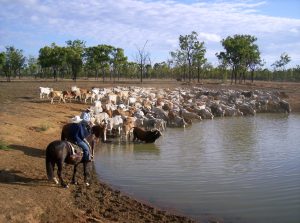
Qualifications and Units Under Review
The workforce of the livestock industry are continually adopting new technologies and methods to improve sustainability, efficiency and animal welfare outcomes in the industry. It is important that the national skills standards for this work are regularly reviewed so that learners are equipped with the skills currently required to operate safely and effectively with and around livestock.
This project continues the work to fully review the agriculture, horticulture, conservation and land management (AHC) training package with a focus on updating units relating to livestock operations. Employees, employers and trainers with relevant experience are encouraged to provide feedback so that updates reflect how work is performed in the industry currently.
A Technical Committee of relevant experts has been formed to provide advice throughout the project. The group met on 22 February 2024 for initial discussions and to review and accept the Technical Committee Terms of Reference and Consultation Strategy. The group is currently working with the project team to review and update the units of competency.
Subscribe for updates
If you would like to receive updates about this project, please subscribe to our newsletter and select ‘agriculture, horticulture, conservation and land management’ as one of your industries of interest.
Next Steps
The draft units and qualification will be made available for comment on this webpage in May 2024. Your input is welcome, please feel free to register your interest to keep informed of project updates and when draft materials are available for feedback.
Register for a Consultation Workshop
In-person and online workshops are planned for May to coincide with the draft documents being made available for broad stakeholder feedback. These sessions will provide further information about the work underway and how you can have input on the updated draft qualification and units.
Register for a session that best suits you.
In-person sessions
Online sessions
Site Visit Consultations
Skills Insight’s Susie Falk and Peter Miller recently visited a cattle property near Mansfield for a site visit as part of this project. Their hosts Emily, James and Clara McCormack treated them to a valuable couple of days. Susie and Peter were able to observe how the McCormacks work with horses and dogs to manage their cattle, how they digitally record calf weight using ear tags, and how they handle the livestock using low stress stockhandling techniques.
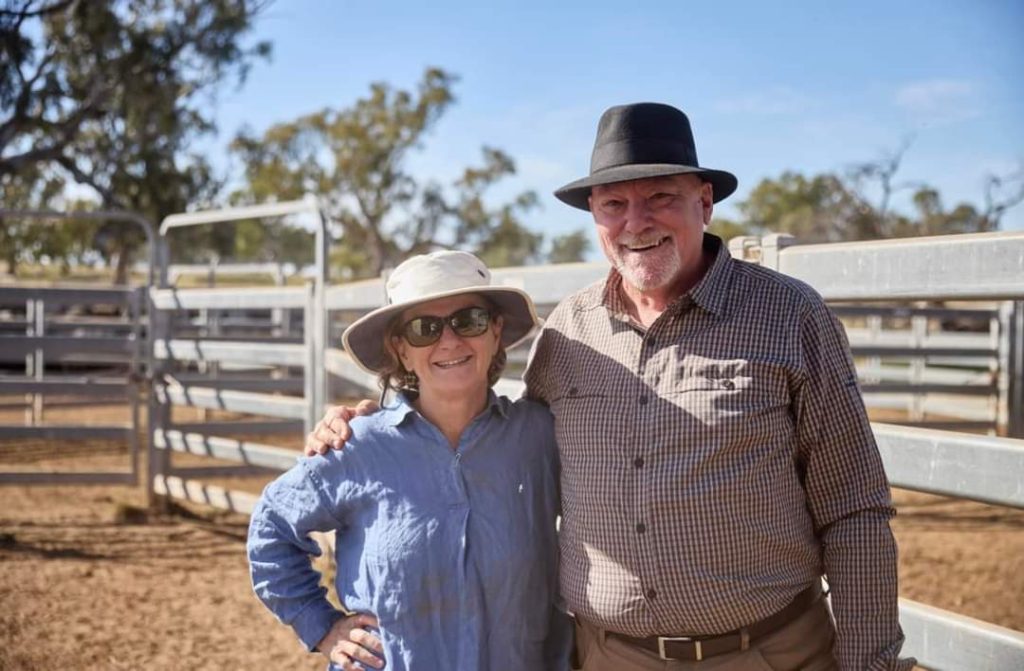
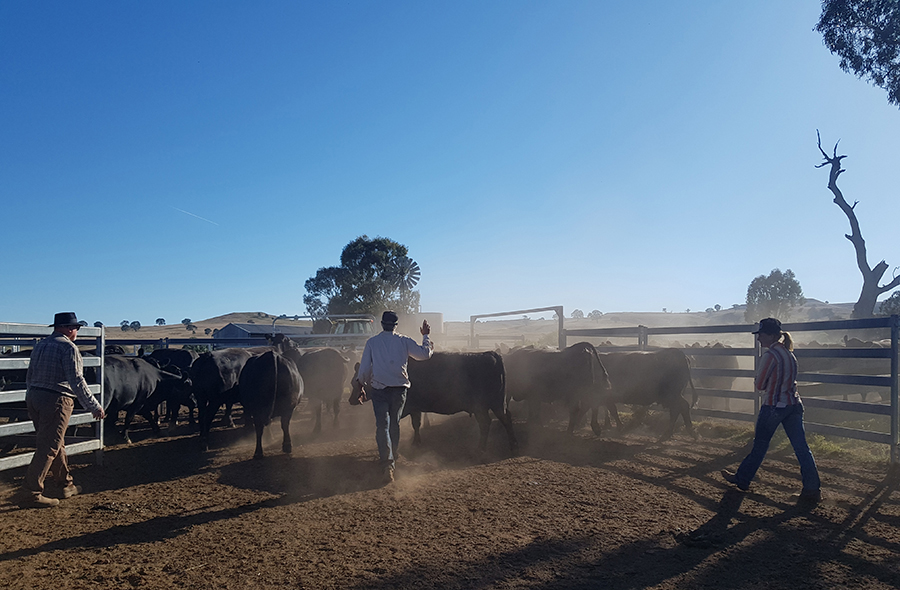
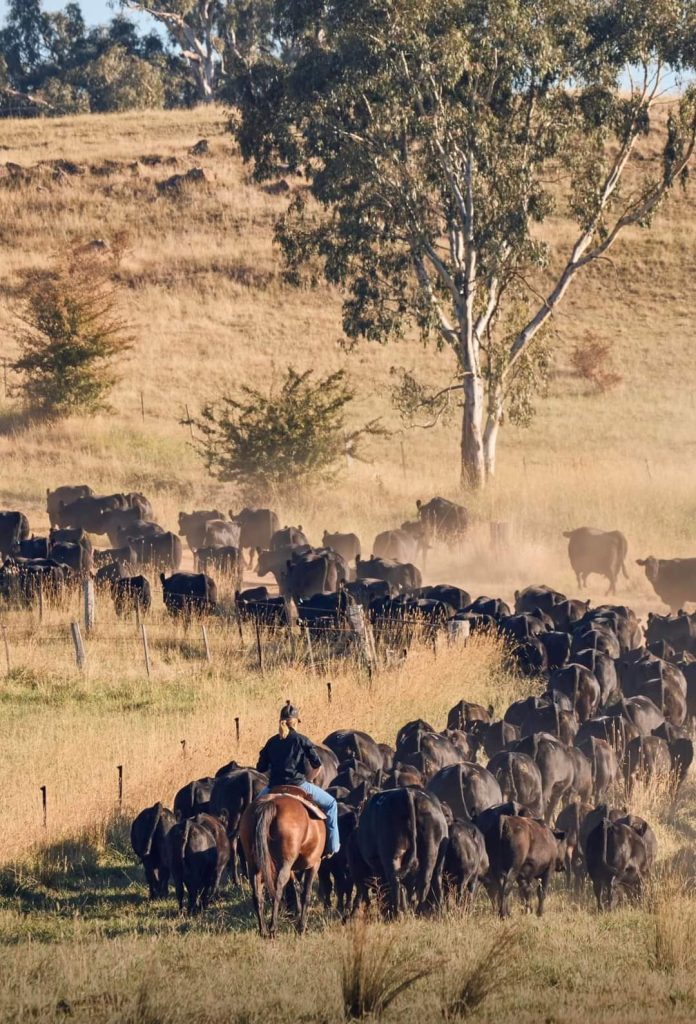
Susie and Peter also had the opportunity to visit Teys Australia’s Charlton feedlot, where low stress stock handling was also a focus. They were able to observe how technology is used to determine how many kilograms of feed has been consumed per animal, and how much more might be needed at the next feeding time. They also saw how riders on horseback survey the stock, looking for any animal with health concerns and separating them out for later treatment. Peter and Susie were then shown how new stock are processed, including tagging and vaccinations.
Through these site visits Peter and Susie were able to experience tasks covered by the units and qualification being reviewed as part of this project.
Consultation is underway to revise the Certificate III in Feedlot Operations and 72 units of competency that support the skills to work in the livestock industry. It is important that the skills standards for working with and alongside livestock are kept up to date, so they reflect the latest technologies, equipment and animal handling techniques.
Thank you to everyone who provided feedback on the draft qualifications and units of competency that were available on this website for review and comment from 3 May to 5 June 2024, and the additional two units that were available between 20 June to 18 July 2024. Your input will be used to inform further updates to the drafts.
There will be further opportunity to provide input into all the documents being reviewed as part of this project during the ‘Consultation Gathering’ stage in July – August 2024.
Subscribe for updates
If you would like to receive updates about this project, please subscribe to our newsletter and select ‘agriculture, horticulture, conservation and land management’ as one of your industries of interest.
Feedback Collected from 3 May to 5 June
A project Technical Committee and subject matter experts were consulted to determine the content of the draft units and qualification and broad stakeholder feedback was encouraged on these draft documents.
Summary of changes
The Certificate III in Feedlot Operations was revised to refer to ‘feedlot operations’ rather than ‘beef cattle feedlot operations’, to allow for broader application of the qualification. The list of job roles was also updated. Biosecurity, environmental sustainability and animal welfare are essential skill areas for work in the sector and so three core units to support these skills were added to the qualification.
Seventy units of competency were revised to reflect feedback received by the project Technical Committee and other stakeholders consulted to date. All units had minor edits to the Performance Criteria (PC) and Knowledge Evidence. Most units remained equivalent as their outcomes remain the same.
There are an additional 20 qualifications and 10 skill sets that include units of competency that are under review as part of this project and/or the Shearing and Wool Classing Project. The degree to which these qualifications and skill sets may be impacted is dependent on the feedback received on the units and whether there is also a need to update their codes.
For a detailed list of changes, please see the Summary of Changes document.
Consultation Workshops
In-person and online workshops were held in May to coincide with the draft documents being made available for broad stakeholder feedback. These sessions provided further information about the work underway and how stakeholders could have input on the updated draft qualification and units.
In-person sessions
Online sessions
View the documents
Click on the accordions below to view the qualification and units of competency that were made available for feedback between 3 May and 5 June.
Feedback Collected from 20 June to 18 July
Feedback received as part of broad consultation on the Certificate III in Feedlot Operations and 70 units of competency between 3 May and 5 June 2024 revealed the need to develop two units:
Why were they developed?
The new AHCLSK2X16 Handle horses for stock work safely unit has been developed to reflect the appropriate techniques for agricultural stock horse work. It is recommended to be used instead of the unit ACMEQU212 Handle Horses Safely which reflects the skills required of horse care job roles outside of the livestock industry.
The Certificate III in Feedlot Operations has been updated to include the newly created AHCLSK2X16 Handle horses for stock work safely unit. AHCLSK2X15 Ride educated horses to carry out basic stock work has also been updated to contain the unit as a pre-requisite instead of ACMEQU212 Handle Horses Safely. The new unit is also incorporated in AHCLSK3X29 Train, care for and ride horses for stock work, which contains AHCLSK2X15 Ride educated horses to carry out basic stock work as a prerequisite.
The need to develop a livestock branding unit has emerged from the need for safe and humane practices in branding livestock. Branding is common practice in Northern Australia and required by law in some areas. National skill standards can promote the use of practices that support animal welfare.
What kind of feedback were we after?
We encouraged feedback about any aspects of the two new units, so that future learners are equipped with the appropriate skills. This included suggestions about the title, application, performance criteria, performance evidence, knowledge evidence, and assessment criteria.
We encouraged your comments on the three existing stock horse units being revised as part of the project, so that they can be reviewed holistically in the context of the new unit. You were also welcome to provide feedback on the updated draft Certificate III in Feedlot Operations and companion volume implementation guide.
For a detailed breakdown of changes to the qualification and existing units, download the Summary of Changes.
In addition, we were interested in your views about how best to refer to ‘good stockhandling techniques’. Previous drafts included references to ‘low stress stock handling’, which was updated to ‘good stockhandling techniques’ to encompass a broader range of methodologies. However, the use of the word ‘good’ raised concerns about subjectivity. An alternative that has been suggested is ‘safe and effective stockhandling techniques’. There is broad support for greater emphasis on the safety of the worker and the wellbeing of the animal in standards for livestock handling skills.
Summary of consultation to date
The Certificate III in Feedlot Operations and units of competency covered in this project were drafted in consultation with the Technical Committee and with small groups of industry and training experts in a series of targeted workshops. Individuals working directly in feedlot operations, general livestock operations, registered training organisations and a representative from a skills council participated and provided information on the skills and knowledge required for job roles and tasks. Three site visits were undertaken; to a grass-fed beef property in Mansfield, a beef feedlot in Charlton and a sheep station in Ballan, to observe job roles in the workplaces. Thank you to those who welcomed the project team to their property and provided feedback during these activities. The project team arranged for further site visits throughout the month of May while on consultation around Australia.
The Certificate III in Feedlot Operations and 72 units of competency that support the skills to work in the livestock industry are under review as part of this project, so that they reflect the latest technologies, equipment and animal handling techniques.
Thank you to those who provided comment on the final draft units, qualification and related documents made available from 9 to 26 August, as part of the consensus gathering process.
Feedback was sought on updates to the qualifications and units, as well as the development of two new units for handling stock horses safely and branding livestock.
Feedback was especially encouraged on the following three horse units, as there were unanswered questions relating to feedback received during Broad Consultation stage:
Specific questions were included as comments on the drafts for ease of consultation.
Input was also sought on the detailed description of the term ‘good stock handling techniques’ that was included in the updated Companion Volume Implementation Guide (CVIG). Good stock handling techniques is a term that was added to several units to highlight the need for a focus on the safety of the worker and wellbeing of the animal. The industry-recognised term encompasses ethical, humane and safe stock handling techniques that are expected to be used throughout the livestock industry.
Note to RTOs
Twenty other AHC qualifications are impacted by changes made in this project, including the Certificates I, II, III, IV and Diploma of Agriculture. For more information see below.
Subscribe for updates
If you would like to receive updates about this project, please subscribe to our newsletter and select ‘agriculture, horticulture, conservation and land management’ as one of your industries of interest.
Online Consultation Workshops
Stakeholder were invited to participate in an online Consensus Gathering workshop to discuss key changes to the drafts and the process for providing feedback. Times are in AEST (Brisbane, Canberra, Sydney, Melbourne).
View the documents
Summary of consultation to date
Thank you to those stakeholders who provided feedback on the drafts that were made available from 3 May to 5 June 2024, under the ‘Broad Consultation’ stage. During this time, feedback was collected via the online feedback hub, national face-to-face consultation workshops and webinars, and via phone calls and emails. Following this round of feedback, further input was collected on two new units, related to handling stock horses safely and branding livestock. Feedback on the two new units, other related units and the qualification was collected between 20 June and 18 July 2024.
The Certificate III in Feedlot Operations and units were drafted in consultation with the Technical Committee and with small groups of industry and training experts in a series of targeted workshops. Individuals working directly in feedlot operations, general livestock operations, registered training organisations and a representative from a skills council participated and provided information on the skills and knowledge required for job roles and tasks. Seven site visits were undertaken to observe job roles in a variety of workplaces. Thank you to those who welcomed the project team to their property and provided feedback during these activities.
This project reviewed the Certificate III in Feedlot Operations and 70 units of competency that support the skills of the livestock industry. Through extensive industry consultation, the qualification and units were updated to align with current technology and practices so that learners are equipped with the skills required to work safely and effectively with and around livestock.
The final units of competency and qualification were endorsed by the Skills Ministers on 3 February 2025 and published on the National Training Register on 11 February 2025.
Before being submitted for endorsement, the qualifications, skills sets and units underwent an anti-discrimination assessment process and consideration and support by the Senior Responsible Officers and the Training Package Assurance Body.
A Consultation Log was submitted alongside the draft units of competency and qualification, which includes evidence of industry support for the changes made. Companion Volume Implementation Guides parts 1 & 2 have also been updated to assist industry and registered training providers (RTOs) deliver the units of competency and qualification. These contain key information to help trainers adapt to the new changes, mandatory workplace requirements, pathways and VET in schools, and additional information about the impacts of regulation and licensing implications and workplace health and safety on their training.
Key outcomes
The use of feedlots in various forms around Australia is becoming more common, ranging from 100% feedlot to fully hybrid properties to properties who use simple feedlots to finish stock immediately before market. Prior to this project, the only qualification relating to feedlots was specifically aimed at beef feedlots. The Certificate III in Feedlot Operations has been revised to refer to ‘feedlot operations’ rather than ‘beef cattle feedlot operations’, to allow for broader application of the qualification. The list of job roles has been updated to better suit those roles currently undertaken on feedlots. Biosecurity, environmental sustainability and animal welfare are essential skill areas for work in the sector and are now included as part of the core of this qualification.
“Wow, I didn’t even know a feedlot qualification existed, this will be fantastic for us.” Fiona McGorman, Owner, Thornby Farm, Sanderston, SA.
Seventy units were revised to reflect feedback received:
Two new units of competency have been created:
The components within this project had not been fully updated since 2011 and have now been updated to satisfy the Standards for Training Packages 2022.
Impacted qualifications and skill sets
As a result of changes made to units of competency in this project and the Shearing and Wool Classing project, 22 qualifications and 8 skill sets have undergone minor updates. There have been no changes to core units however, unit codes and titles of superseded elective units have been updated.
Summary of Consultation
Thank you to everyone who volunteered their time and expertise throughout this project. At the start of the project, a technical committee consisting of 10 individuals, with at least one representative from each state and territory was established. The technical committee included RTOs, peak body representatives and employers and provided input and guidance throughout the project.
Stakeholder feedback was received on the draft documents made available on this webpage at two stages, during the ‘broad consultation’ stage from 3 May to 5 June 2024 and additional units between 20 June to 18 July 2024 and again at the ‘consensus gathering’ stage from 9 to 26 August 2024. Feedback was encouraged and collected via site visits, national face-to-face consultations workshops and webinars, via phone calls and emails and the website feedback hub.
The Certificate III in Feedlot Operations and units were drafted in consultation with the technical committee and with small groups of industry and training experts in a series of targeted workshops. Individuals working directly in feedlot operations, general livestock operations, registered training organisations and a representative from a skills council participated and provided information on the skills and knowledge required for job roles and tasks. Eight site visits were undertaken to observe job roles in a variety of workplaces. Thank you to those who welcomed the project team to their property and provided feedback during these activities.
There are another 22 qualifications and 8 skill sets have been impacted by the changes made to units of competency in this project and/or the Shearing and Wool Classing project. These are listed in the accordions below.
Consultation
“It was a great session today, and it is great to see so many great minds working on these projects to make them the best they can be. We are very appreciative with you guys hearing us with those new units and are stoked that they are popular.“
Georgia Anderson, VET Lecturer / Workplace Assessor, Agriculture & Rural Operations, CDU Katherine Rural Campus.
All feedback has been recorded and responded to in the Skills Insight database. Below you can view a summary of feedback from the ‘Broad Consultation’ stage and how it has been considered and addressed. A summary of feedback and responses for the ‘Consensus Gathering’ stage will be available soon.
Endorsed and published documents
Click on the accordions below to view the documents on the National Training Register.
Project background
As the agriculture, horticulture, conservation and land management (AHC) industry adapts to technological advancements, shifting markets, and environmental concerns, it is important that the AHC training package can be updated holistically and on a regular basis.
Given the many unique and interrelated skills across the industry, a strategic approach is being undertaken to identify and review units by their sector classification rather than their listing in qualifications.
Following a staged process, the Unit Sector approach allows us to:
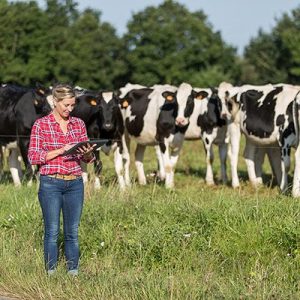
2024 Projects as part of the Unit Sector Approach
There are two projects taking place in 2024, as part of this work. Each will be undertaken separately but run concurrently, allowing for a more targeted consultation while ensuring that the projects can simultaneously review and address any overlaps between them.
The Livestock Operations Project will also update LSK units that are core in the Shearing and Wool qualifications.
A project to analyse the how the AHC21216 Certificate II in Rural Operations is being used is also underway concurrently with these projects.
Recent Projects as part of the Unit Sector Approach
2019 – 2020
Biosecurity, Conservation and Ecosystem Management, Rural Merchandising, Horticulture and Nursery
2020 – 2021
Landscaping, Parks and Gardens, Crops, Pastures and Seed, Dairy and Milk Harvesting
2021 – 2022
Permaculture, Composting, Organic Production, Pig and Poultry, Respect for Country, Ag & Horticulture Core Skills



